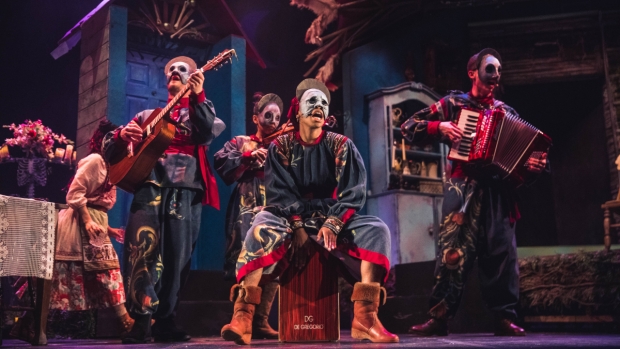The House with Chicken Legs at HOME Manchester – review

© Andrew AB Photography
It could hardly be more fitting for a show about a moving house to be housed in a theatre called HOME. These kinds of playful ironies are the bricks and mortar of Les Enfants Terribles' adaptation of Sophie Anderson's children's novel — the multimodal theatre company's first original stage show in ten years, marking their 20th anniversary. They craft here charm and beauty, but with less structural integrity.
Inspired by the Slavic fairy tales shared by her own Prussian grandmother, Anderson's story follows 12-year-old Marinka, granddaughter of the spirit guide Baba Yaga. Both drinking and guiding spirits, Baba (a delightfully mad and maternal Lisa Howard) presides over a gate between two worlds. It's a threshold causing Marinka similar contrasts and conflicts to adolescence. Wearing a navy bomber jacket over a white lace dress, instead of playing fetch with a pet dog, she throws a bone to her jackdaw friend.
Her uprooted feeling is conveyed in the off-kilter design, also understanding that the best children's drama delights and disturbs — the need for eerie darkness to creep into the fantasy. Samuel Wyer's spirit masks, for example, are grey, gaunt and spectral, yet with a haunting funereal beauty like silver moons or an ancient death mask. A sparkling black fan is flared out for the jackdaw's wings, the fluttering fabric beating like feathers against the air.
It finds a tender poetic language for confronting the transience of life and mortality — "the great cycle" — largely through Wyer's puppets. They're not cutesy, but have an aged, worn character — the symmetry of wood and bone as materials binding us to the earth. Their uncanniness pulls you into entrancing moments of delicate, intricate storytelling: two friends paddling atop the waves of swivelling blue umbrellas; a grandmother traversing a mountain of levitating books with a bundled baby. It has even subtler touches, such as a drum played to celebrate life, then serving as a zimmer-frame supporting the same spirit to the afterlife. It therefore seems odd to stage a dramatic climax on a vast digital animation, and unnecessary to manifest giant floppy chicken legs in scene transitions.
The performances play with the recurrent image of the floating dead through the weight of movement. As a dying girl Marinka tries to befriend and save, Keshini Misha's arms surge out into skyward swoops or plunging dives as she imagines escaping to mountains or oceans. Eve De Leon Allen's posture is contrastively sunken as Marinka's anchored down to her destined housebound duty.
However, the show's two halves are not so much semi-detached as two completely different builds. In the clumsier second, songs descend into pop mawkishness: "We're not misfits, we're miracles". And it foregoes the first half's carefully constructed metaphor for coarsely ladled declaratives that "humans need to take better care of their home." The play retains the bagginess of Anderson's long book, accentuated by the second-half's more sluggish pacing and increasingly cumbersome manoeuvring of the huge house. It constantly references going to the stars, but its heavy-handed second-half grounds it on earth.










